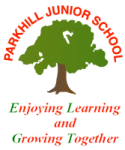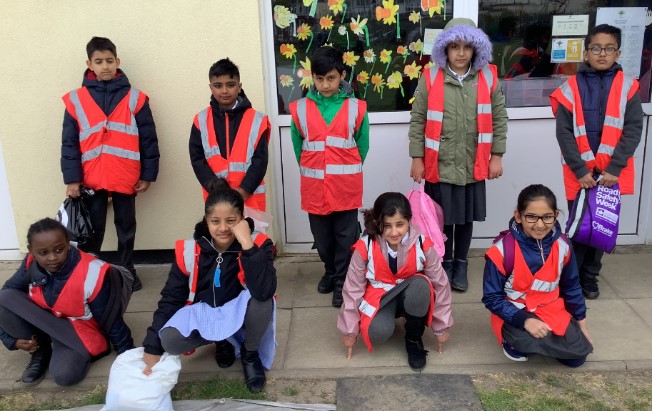Vision:
At Parkhill Junior School our vision for computing is to keep our pupils safe online. We provide them with the knowledge and skills to do so.
We recognise that as a school we have a responsibility to prepare the pupils for their future by improving their knowledge and understanding of how imperative technology is as an aid to learning and the real world beyond school.
As computing is an increasing part of life today it is essential that all pupils gain the confidence and ability that they need in this subject, to prepare them for the challenge of a rapidly developing and changing technological world. The use of technology will enhance and extend children’s learning across the whole curriculum whilst developing motivation and social skills.
We aim to expose children to the educational developments in computing and provide them with the opportunities to access to the most effective and emerging technologies. We highly value the positive impact technology can have in providing a high-quality education (Article 28).
It is our intention to enable children to find, explore, analyse, exchange and present information. We also focus on developing the skills necessary for children to be able to use information in a discriminating and effective way. We want children to know more, remember more and understand more in computing so that they leave primary school computer literate. Computing skills are a major factor in enabling children to be confident, creative and independent learners and it is our intention that children have every opportunity available to allow them to achieve this.
Intent:
At Parkhill Junior School we believe a high-quality computing education equips pupils to use computational thinking and creativity to understand and change the world. Computing is a significant part of everyone’s daily life, and we believe that children should be at the forefront of new technology.
Here at Parkhill, we believe in a melting curriculum where we integrate different aspects of the curriculum together as an integral part of learning to develop a deeper understanding. Computing can provide a wealth of learning opportunities and transferable skills. Children must be taught in the form of ‘computational thinking’ in order to provide them with essential knowledge and skills to effectively participate in the digital world.
Parkhill Junior takes internet safety extremely seriously. We have an online safety policy that provides guidance for teachers and parents. We also have digital leaders who help remind staff and children on the importance of online safety through the delivery of assemblies, safer internet day lessons and activities as well as provide feedback on a weekly basis.
Implementation:
At Parkhill Junior school, the children will design, write, and debug programs that accomplish specific goals, including controlling or simulating physical systems; solve problems by decomposing them into smaller parts. They will use sequence, selection, and repetition in programs, use logical reasoning to explain ow some simple algorithms work and correct errors in algorithms and programs.
Children will be taught to understand computer networks, including the internet, and the opportunities they offer for communication and collaboration. They will use search technologies effectively, learn to appreciate how results are selected and ranked, and be discerning in evaluating digital content. Children will be taught to select, use and combine a variety of software (including internet services) on a range of digital devices to create a range of programs, systems and content that accomplish given goals. They will use technology safely, respectfully, and responsibly; recognise acceptable/unacceptable behaviour; identify a range of ways to report concerns about content and contact.
We have a dedicated suite of 25 desktop computers as well as a library resource centre which provides access to another 10 desktop devices. We also have 30 Apple ipads to use within and across lessons. We also have 6 makey-makey kits as well as 5 Lego WeDo kits which provides the physical system education aspect of the curriculum. Opportunities to further develop and practise skills are provided through an after-school coding club.
Lessons are planned to provide for and include all children, including those with SEND, higher achieving pupils, pupils with EAL needs as well as from social and cultural backgrounds.
Impact
After the implementation of our robust curriculum, children will leave Parkhill Junior digitally literate. They will be able to safely and effectively navigate technology allowing them to be independent thinkers who can problem solve, think logically, evaluate content and information and be confident in a technological world. Children will understand the consequences of using the internet and will, most importantly be knowledgeable on how to keep themselves safe. Our Computing curriculum is high quality, well thought out and is planned to demonstrate progression. If children are keeping up with the curriculum, they are deemed to be making good or better progress. In addition, we measure the impact of our curriculum through pupil discussions about their learning.
We are creating a more sustainable teacher -led assessment tracking grid which will explicitly identify the requirements within the different aspects of computing at different levels. This will be collected on a termly basis provided by each classroom teacher. This will identify children as ‘Emerging’, ‘Developing’ or ‘Exceeding’ and will be based on the objective statements outlined for each year group, matched to each child’s ability.
Children will be able to:
*understand and apply the fundamental principles and concepts of computer science, including abstraction, logic, algorithms, and data representation
*analyse problems in computational terms, and have repeated practical experience of writing computer programs in order to solve such problems
*evaluate and apply information technology, including new or unfamiliar technologies, analytically to solve problems
*Children will be responsible, competent, confident, and creative users of information and communication technology.
Our Online safety policy here:
Online Safety Policy
National Online safety Tab:
Here is where the NOS logo can go that is currently on the webpage.
A parent letter:
NOS parent letter
And NOS resources:
NOS resources
Links:
|
DFE Computing programmes of Study |
|
|
National Online Safety |
|
|
Monthly online safety newsletter |
Sent out monthly from Knowsley City Learning Centre. |
|
Understanding social networking sites and how to keep children safe. |
|
|
Great advice to help keep children safe. |
|
|
Safety information for the whole family |
|
|
Report any illegal content on the internet |
|
|
Keep up to date with any e-safety issues |
|
|
Safety information for parents |
|
|
Information on gaming safely with resources for parents and children. |
|
|
Understand and share the world of social networking websites |
|
|
Discuss concerns, feelings and worries. |


